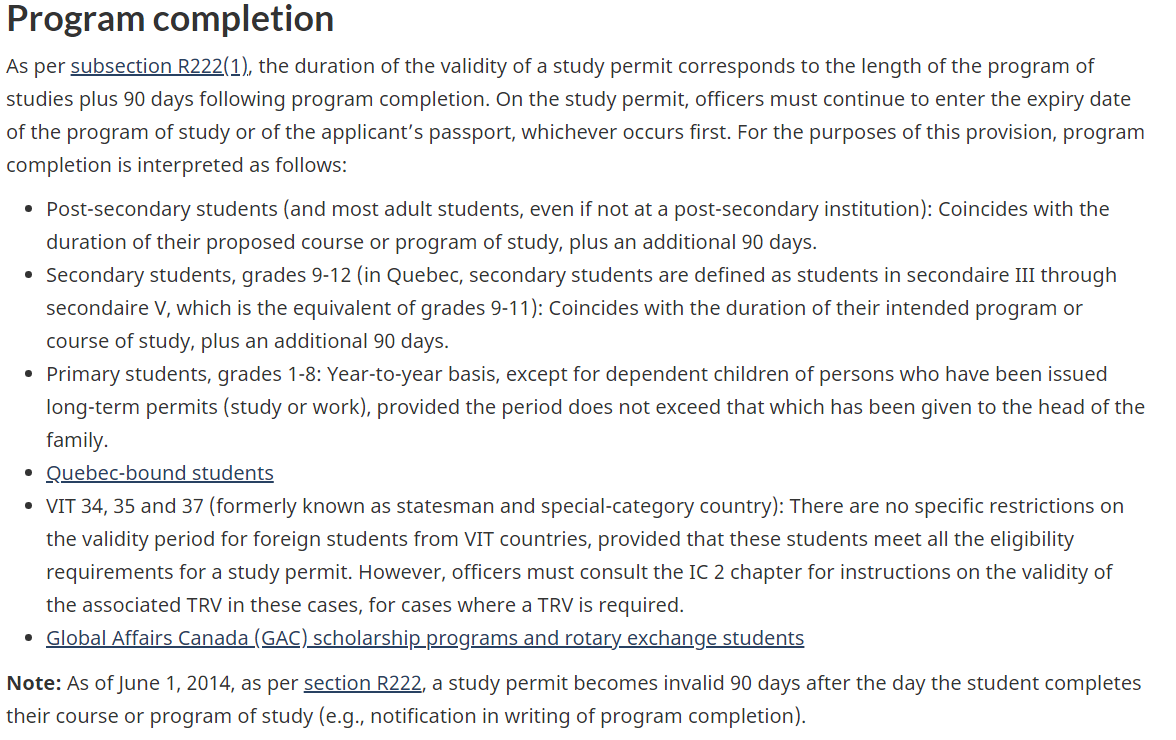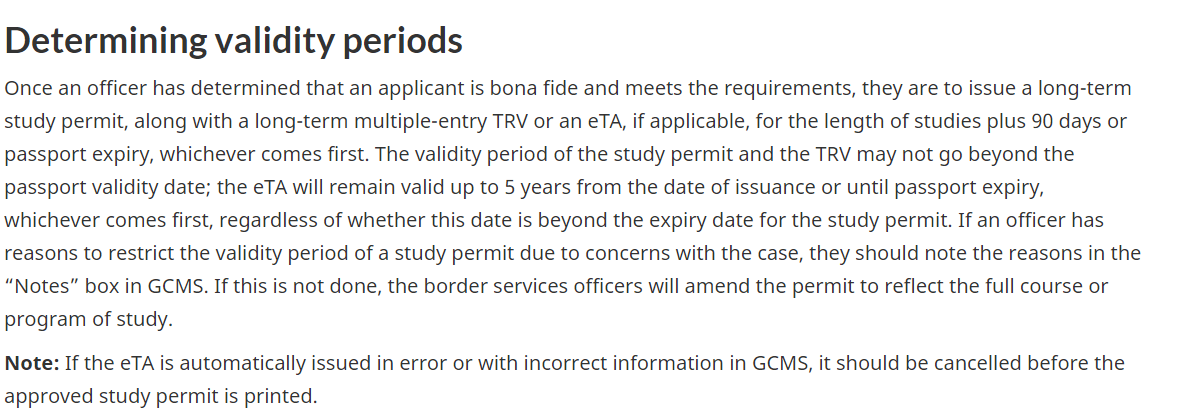Much of Canadian Immigration Law and Regulation around international students in Canada is given life through program delivery instructions that set out the relevant policies. I have explored in recent blogs how posted policies can conflict with the operation of the law under IRPR and IRPA , which often constrain the efficacy of changing law.
I have written blogs about the 7 January 2019 change to assessing the ‘actively-pursuing studies’ requirement and the 14 February 2019 changes to processing instructions for the Post-Graduation Work Permit Program.
Since then there have been several other new program delivery updates that affect international students:
1. Co-op work permit – 7 March 2019 – https://www.canada.ca/en/immigration-refugees-citizenship/corporate/publications-manuals/operational-bulletins-manuals/updates/2019-co-op-permit.html
Co-op work permits previously came with acondition (condition 21) that holders were ‘not authorized to work for any employer other than stated.’

The problem with this previous condition was that it created confusion among employers who did not see their name on the permit and as well created confusion as many co-op programs required multiple employers.
This is a welcome clarification that assists students and their co-op employers alike.
2. Co-op work permit clarification – 1 April 2019 https://www.canada.ca/en/immigration-refugees-citizenship/corporate/publications-manuals/operational-bulletins-manuals/updates/2019-co-op-permit.html
In a follow-up clarification, IRCC then posted new instructions on a page titled Work related to a research, educational or training exemption code C31, C32 and C33 (International Mobility Program)
One of the unique elements of this new page is that under a subheading titled Post-secondary co-op – exemption code C32 eligibility, updated instructions are provided to clarify conditions to be entered by the officers in Canada on GCMS when issuing the work permit.
In addition to the requirement of leaving Canada (condition 18), it is interesting that condition 26 – again going to blanket ban on foreign workers engaging in employment in businesses related to the sex trade, such as strip clubs, massage parlours, and escort services” is re-emphasized as a condition. I am working some potential litigation involving individuals who are not employed (i.e. self-employed) in these areas in order to support themselves and their studies financially and would love to speak to anybody subject to enforcement on this basis.
The rest of the focus on these conditions is on designated and non-designated countries (i.e. those countries where you have lived or traveled in the past six-months). The conditions on the work permit will be different depending on both of them, with an additional condition of ‘not authorized to work in agricultural occupations’ (condition 16) added to those individuals from designated countries.
Hidden in a bit in the last point, IRCC also wants to ensure that the duration of the co-op work permit and study permit should be the same. It was in the past not uncommon for students to have a co-op work permit valid for several months after their study permits expired, creating confusion as to whether those permits authorized continuing work in Canada.
3. Post-graduation work permit length for 2 combined programs – 5 April 2019 – https://www.canada.ca/en/immigration-refugees-citizenship/corporate/publications-manuals/operational-bulletins-manuals/updates/2019-post-grad-length.html
While the posted changes affect Quebec vocational programs with a diploma of college studies (DCS) and an attestation of college studies (ACS), it is important to read this particular page carefully as it provides important information about the length of a post-graduate work permit vis-a-vis the program.
There are a few takeaways of note:
[1] The letters written by DLIs become very important especially around the issue of accelerated studies and to clearly lay out that the students completed the program in accelerated. Failure to do so can lead to shorter post-graduate work permits. These issues are resolvable through applications to extend and amend but could create new graduates uncertainties and hardship in the interim.

[2] IRCC has appeared to give a blanket rejection to laddering programs.
Prior to these these clarifications (implemented in February 2019, I believe with the new changes), a common practice was for private colleges who were not PGWP-eligible to partner up with programs that were to sign matriculation agreements. IRCC was previously giving credence to the length of the combined programs these schools. Meaning that a 1-year ineligible program combined with a 1-year eligible program (in which the individual received the equivalent to a 2-year diploma), did in many cases result in a 3-year post-graduate work permit. This door appears to be closed with the clarified instructions.
4. Study permits: Making an Application – 11 April 2019 and 5. Validity periods and acceptance letters for study permit – 16 April 2019 –
There is a lot packed into this update and I think it deserves it own article frankly.
I’ve posted a series of tweets to highlight some points I looked at. I will try and do a deeper analysis later – especially on new interpretation of R. 215 IRPR and studies which opens up a slew of opportunities for applicants in various situations.
There was a really important set of study permit instruction changes that no one is talking about. Let me run you through some of them. #intled #cdnimm
— Will Tao|陶维 (@TheWillTruth) April 29, 2019
Students switching from secondary school to post-secondary used to need a new study permit (via extension) before starting their new studies. No longer the case. Valid study permit is still good. pic.twitter.com/6jILhyfwPP
— Will Tao|陶维 (@TheWillTruth) April 29, 2019
Students who are in pre-requisite studies CAN work on campus but CANNOT work off-campus. Officers will step up including notation on these study permits and students will be required to submit extension applications to amend the conditions. pic.twitter.com/RT4TXOS4sZ
— Will Tao|陶维 (@TheWillTruth) April 29, 2019
Keep the post-mark date legible. I think this was always the rule but a poor photocopy could lead to an application being refused and the student losing status. pic.twitter.com/1aVgex1p60
— Will Tao|陶维 (@TheWillTruth) April 29, 2019
R.215 has been re-interpreted to allow students who become eligible to apply for a study permit within Canada as a visitor and applied for a study permit to begin their new program as soon as they have applied for a study permit. This creates lots of interesting possibilities. pic.twitter.com/E6jGhL9xSZ
— Will Tao|陶维 (@TheWillTruth) April 29, 2019
I also did a series of tweets previously on this topic, but the validity period information was also amended to clarify that Officers should be entering the study permit expiry date as the date of expiry of the study or the applicant’s passport, whichever occurs first.
Reading this in conjecture with the Study permits: Final decisions page, there seems to be a little confusion as to how to reconcile program completion with validity period.


The appropriate step, from my perspective, is to ensure that the expiry of the study permit should still be 90 days after the end of the program of study. This will ensure that the expiry of that study permit will be consistent with the statutory expiry date under R. 222(1) IRPR. If the study permit is given a shorter expiry date (program of study end date), students will have to file an extension that creates more administrative work for studies they may have already completed. Most students will need to have a valid a study permit to both take advantage of the ability to apply inside Canada (R.215 IRPR) and to work according to R.186(w) IPRR prior to a decision made on their PGWP. The instructions are not currently written in the clearest form for Officers to interpret.
Several institutions, understandably to try and protect their students from running into study permit expiry issues, recommended putting a date that was after the actual completion date in study permit forms – meaning students often received study permits that were 120-180 days after the completion of studies. This should put an end to this practice.
With IRCC now clarifying that study permits expire 90 days after completion of studies but also clarifying that they will need to re-engage in studies within 150 days of completion, we will see an important extension window in those 60 days for students to get back into school if they are not eligible for PGWPs or are refused PGWPs and unable to restore their status. I am clarifying how restorations will work under this new regime and will update that in a future blog!
Takeaways
What you are seeing now is the Government really tinkering with the details (the grey areas) that previously left students and institutions unclear when advising on work and study. In most of these areas, we have seen a shift towards flexibility and giving students and officers more specific instructions, especially on timing.
I do believe that we will continue to see issues with students transitioning between studies and to post-graduate work permits in this interim period – as these timing issues are not always perfect.
I also do predict that there will be a period of time where institutions, and then to their students (through relevant channels such as student presentations, consultants, agents, etc.) will need to disseminate these new rules changes to their students. I would suggest seeking professional help from lawyers and consultants and coming up with a comprehensive strategy for this process.

